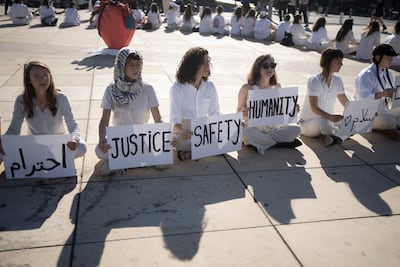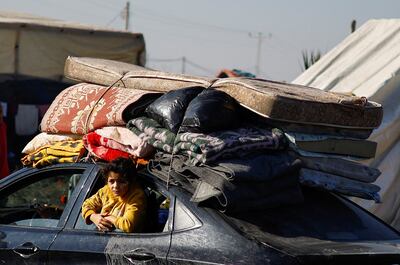Live updates: Follow the latest news on Israel-Gaza
New proposals put forward by Egypt to end the war in Gaza provide for a permanent ceasefire, a phased Israeli withdrawal from the coastal enclave and a detainee and hostage swap that begins with the release of civilians held by Hamas, according to a draft of the plan seen by The National on Wednesday.
The two-page plan is the latest draft tabled by Egyptian mediators after an earlier version failed to gain traction with either of the warring parties in the 12-week conflict.
The proposals agree broadly with those outlined in numerous recent reports that were attributed to Egyptian security sources.
But the draft seen by The National contains many details not included in those reports and appears to have been tweaked to accommodate the initial reservations aired by Hamas, Israel and the Palestinian Authority.
The draft plan prescribes a first phase in which a “humanitarian deal” of 10 days is declared after a two-day truce in which the two sides will indirectly negotiate the lists of hostages and prisoners to be released. Egyptian, American and Qatari mediators will facilitate these negotiations, which will be held in Egypt.
In the meantime, the two sides would observe a complete cessation of hostilities, including aerial activity by Israel, with reconnaissance and drone flights over Gaza included.
Hamas would release women, the elderly, children and ailing hostages in exchange for a suitable number of Palestinians to be freed from Israeli jails.
The second stage of the plan lasts for seven days and stipulates the release of Israeli female soldiers and all human remains held by Hamas in exchange for more Palestinian detainees. Israel will redeploy its forces from urban areas under a continuing ceasefire.
The third stage envisages a one-month window of negotiations over the release of the remaining male Israeli soldiers held captive in exchange for an undetermined number of Palestinian detainees. During this period, Israel is expected to conduct a complete withdrawal of its forces from the enclave, according to the draft.

Egyptian officials with direct knowledge of the process said the new draft leaves out some of the details leaked by security sources, such as Hamas giving up control of Gaza, the specific number of hostages and prisoners to be released, and the fate of Gaza after the cessation of hostilities, or what have become known as “day-after” scenarios.
They said the plan was put together with input from Qatar and the United States. The three countries mediated a week-long truce that ended on December 1, under which substantial humanitarian aid entered Gaza and the two sides released scores of hostages and prisoners.
The latest draft says the three countries will jointly monitor and supervise the implementation of the Egyptian proposals.
The officials, however, cautioned that the text is a work in progress and could be amended further to accommodate new reservations by the stakeholders.
“The situation could develop into a regionwide conflict in one second and one in which we may also see a ceasefire in Gaza declared," one of the officials said.
The Gaza war began on October 7 when Hamas launched raids into southern Israel, killing 1,200 people and taking 240 hostages back to the territory.
Israel responded with a relentless bombardment of Gaza that has to date killed more than 21,000 Palestinians, razed significant areas in built-up neighbourhoods and displaced the vast majority of the territory's 2.3 million residents.
Hamas and its ally, Palestinian Islamic Jihad, are known to still be holding nearly 130 hostages.
The second stage of the plan stipulates the release by Hamas of female Israeli soldiers and human remains the group has in its possession and allows substantial humanitarian aid into the besieged territory during a seven-day pause.
In return, Israel will free another batch of Palestinians – the exact number to be agreed by both sides – held in its prisons, according to the text.
Israeli officials estimate that 20 of the hostages held by Hamas have died or been killed in captivity. Hamas is known to be holding at least five female Israeli soldiers.

The third phase of the plan, according to the latest draft, provides for one month of negotiations on the release of all Israeli military personnel held by Hamas in return for a number of Palestinian prisoners whose number is to be agreed by the two sides.
During this phase, Israel is expected to pull out its forces from Gaza and continue to suspend aerial activity over the territory. Hamas will also refrain from all military activity targeting Israel.
Israeli Prime Minister Benjamin Netanyahu has not directly commented on the Egyptian proposals but has been adamant that the war is far from over and will end only when Hamas is destroyed.
Hamas and Palestinian Islamic Jihad have publicly rejected the initial proposals.
The Egyptian officials, however, said Israel and Hamas were in fact still studying the proposals.

The latest draft makes no mention of proposals previously discussed by stakeholders for holding legislative and presidential elections in Gaza and the occupied West Bank and a revamped Palestinian Authority to run Palestinian territories as a prelude to the creation of a demilitarised Palestinian state.
It also makes no mention of proposals for a UN-led multinational force to be deployed in Gaza for a limited period immediately after the cessation of hostilities.
Moreover, the latest draft of the proposals does not cover topics that the officials said were under discussion by mediators in contact with Hamas and Israel.
Israel, for example, agrees in principle to a ceasefire but on condition that top Hamas leaders in Gaza leave the territory to live in exile, the officials said. They include Yahya Sinwar, Israel’s most wanted man, and others responsible for the October 7 attacks.
Hamas leaders categorically refuse to leave the territory, reject their exclusion from any future administration in Gaza and oppose a demilitarised Palestinian state, the officials said.
Mr Sinwar also wants a transitional period of up to three years during which the reconstruction of Gaza is completed, before legislative and presidential elections are held, they said.
While the Egyptian proposals are viewed as a positive sign, the US is sceptical they will result in a breakthrough, one of the officials said.
Egypt, a close US ally that shares borders with Gaza and Israel, became the first Arab country to sign a peace treaty with Israel 44 years ago. Qatar, also a US ally, is home to Hamas’s political leaders and maintains informal contacts with Israel.


